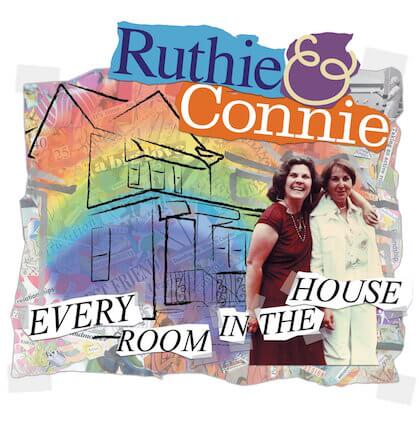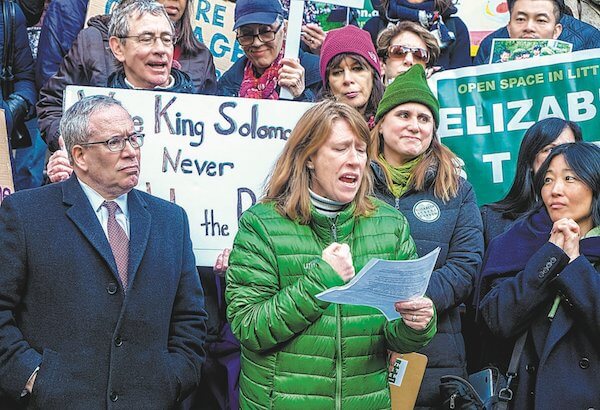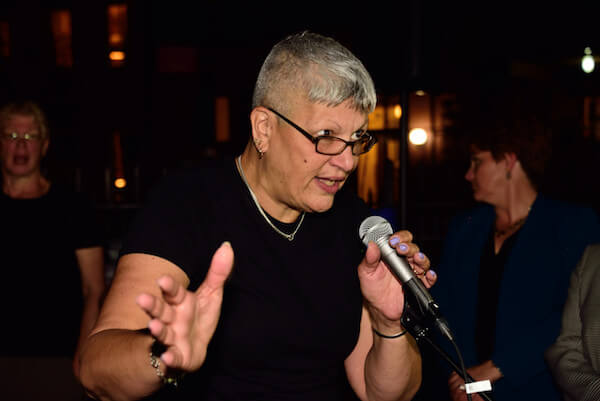Perry Brass as a school boy. | COURTESY: PERRY BRASS
On September 15, I turn 70.
How could it happen? It’s a question I’ve asked myself for a long time, and when I was younger it seemed so far away that it was unimaginable. 70, that is old.
There is no way around it. I have stopped telling myself that I am anything but an old man, but, definitely, I am not an old man the way I remembered old men in my youth. The gay, lesbian, straight, bi, trans (and even all those “micro-sexualities” and “genderalities” somewhere in the middle) Baby Boomer generation is heading toward the Big 7-0, and really changing the perceptions and definitions of age and aging. The generation that said, à la the Who song, “Hope I die before I get old,” is now… well, old. But we are looking at it more creatively, with more flexibility, and with enough surprises in common emerging that some are now being institutionalized and accepted within the culture.
Pioneering LGBTQ activist says his generation now embraces its “oldness
Among them: that you are never too old to change, and that nothing is too young for you — although some things, like the big-time drugs we used to take and the over-the-top binge-eating-drinking-and-sexing, too — I’m afraid to admit, are.
COURTESY: PERRY BRASS
I am a peculiar old man. Like a many of my gay contemporaries, there’s still some wild boyishness left inside me from the 1960s and 1970s. I have prostate cancer, but I have kept my body in great shape. I have a 32” waist; weigh what I did at 30 — about 150 pounds — can do 100 push ups (in four sets of 25, to prevent too much stress on joints, something seniors need to watch), can stand on my head for 90 seconds, and generally walk faster than most New Yorkers. I enjoy a drink in moderation, an occasional drag on a joint, and a real sex life.
I hate it that some of my friends have, as I put it, “abdicated” their bodies: they have let themselves go completely out of shape, and this has affected their entire being, leading to skeletal problems as well as sleeplessness and depression. Regular exercise is a great anti-depressant, and a good key to sleep. So is sex, but then so is keeping up with what’s new and happening, and also happening to have younger friends as well as older ones.
That is an important aspect of growing old: not staying locked inside your own generation. Breaking out of that is getting harder, especially in a very “specialized” city like New York where it’s easy to be categorized, shelved, and “processed” according to age, wealth, and looks. It’s important not to fall into that, but luckily, numbers of young people do want to get to know me. They want to know about New York before it became totally Starbuckized, when you weren’t being eaten alive by real estate and the Donald-Trumpized, 20-teens winner-take-all career rat race. It’s important to make friends with younger people: they have much to tell me, just as I have to tell them.
Back to sex: Another “surprise” of my generation is that a lot of Boomer men are interested in each other; in other words, older men are going for other older men, instead of running after boys young enough to be their grandkids. We are finding older men sexually and romantically attractive. You still find men in my age bracket chasing after guys 40 years younger — while still complaining loudly about ageism in the gay community (and, like Jack Nicholson before he met Diane Keaton in “Something’s Gotta Give,” assiduously avoiding anyone their own age), but this once-bitter stereotype of older queer men is far from the complete picture.
COURTESY: PERRY BRASS
This means the glass ceiling of sexual attraction is being raised by us — a lot. When I was a kid in the mid-1960s venturing out into the dark, secret Gay World, the attitude was that you were approaching “through” at 25, then totally “washed up” by 30. Much of this had to do with either being nailed tight into the closet or else risking being labeled as that most pathetic of creatures, the ghastly “aging homosexual,” an acid-laced revelation in too many bad Broadway plays. This also left multitudes of us scared shitless of that question Aunt Tillie was bound to ask at the next obligatory family blood-letting:
“So, boychik? Why aren’t you married?”
The immediate internalization was that if you just looked or acted 22 forever, you could score a free pass on that one. This gave rise to that phenomenon seen often in gay bars: the “world’s oldest college kids” — dudes in their 40s, 50s, and beyond still in college sweatshirts and penny loafers. You were just never too old to be an undergraduate, or at least pretend to be one. From my teens, I recall seeing older men wearing what I called “the mask of youth”: shoe-polish-dyed hair, dead-cat toupees, iron-mask face-lifts — all while being stuffed into clothes so tight that real high school boys would have barfed at wearing them.
As a teen, pre-Stonewall, I was in Julius’ once in the West Village and innocently asked a stylish-looking woman, “Where are all the older gay men?”
She shrugged. “They just commit suicide.”
There was no place to go: You were in this poisonous “Boys in the Band” world where your very existence was questioned daily. Everybody knew it, no matter how rich, successful, or powerful you were. Artists like Edward Albee knew it, though he could barely put it into words. Gay Liberation, no matter how you defined it or even didn’t want to admit it, changed all that, and it also changed aging.
COURTESY: PERRY BRASS
You don’t have to apologize any longer for being older and gay. Men I know in their 60s and 70s are finding boyfriends and even husbands. Why not? There may be more behind you than in front of you, but that doesn’t mean that what’s in front has to be bleak. There is something about love with age that’s exquisite, with big, amazing passions in it. But you have to come out of yourself to have it. Aging does, for too many reasons, isolate you.
That may be the worst part about it, worse than losing your hair and short- term memory. It’s too easy to be by yourself when you’re old. Organizations like SAGE and other senior centers are helpful, but in a city that has a penchant for keeping people locked alone inside their small apartments, even SAGE may not be enough. (Frankly, though, I think the city is a great place to be old in, as opposed to being alone in the suburbs and dependent on driving — especially at night, a skill that becomes harder with years.)
You need to come out of yourself, as hard as that may be. A lot of older people complain about feeling invisible, and it is often sadly true: we are. I noticed that myself, although it took me several years to admit it. At the beginning of my “adventures in being 60,” I almost enjoyed it, because writers, like spies, can like not being seen. We like being those ears inside the walls. But at a certain point, it bugged me, too. You have to come out of your invisibility, and start making noise and reminding people you’re still here. It means you stop taking a great deal of shit, and no matter how polite you were raised to be, step up to talk back.
But — don’t get slotted into being the curmudgeonly old man either. You have to learn to cut people some slack, including yourself. Older people generally like quiet — I have loved it all of my life — but you have to allow that kids will be noisier than you want them to be and are often completely unaware of it. At this point, I say thank God for noise-canceling earphones. They return a lot of my own sanity back to me. I was a kid once too — and for a very long time — but it’s still easy to forget the crazy impetuousness of your own youth.
Perry Brass today. | COURTESY: PERRY BRASS
A good way to remember is to allow yourself some of that, too. As Trevor Howard said to Celia Johnson in “Brief Interlude,” “We’re only middle aged once.” Okay, but I’m only this age once also. I still like riding around in cars with boys, I still like getting giddy on champagne, or flirting outrageously, or having other men flirt with me. I still love having close friends and making new ones. And having that excitement that something fantastic is going to happen, and I can’t wait for it to — whether it’s seeing a new show, or writing a poem, or starting a book, or meeting someone who opens up a whole new space in my heart, or letting someone I’ve known for a while lead me directly, beautifully, to it — those are only some of the “young things” I don’t want to ever let go of.
Some of my friends tell me it’s painful to look in the mirror now or look at photos of themselves: I understand that. Sometimes I wonder who is this person that I have lived with for 70 years? The best thing I can say is that I will always allow him to surprise me, and that is what is keeping me going.
Perry Brass has published 19 books, including poetry, novels, short fiction, science fiction, plays, and bestselling advice books (“How to Survive Your Own Gay Life,” “The Manly Art of Seduction,” “The Manly Pursuit of Desire and Love”). Active in the movement toward lesbian, gay, bisexual, and transgender rights since 1969, Brass’ work deals with issues of sexual freedom, spirituality, and personal politics coming out of his involvement with the Gay Liberation Front right after the Stonewall Rebellion. In summer of 2018, he will be publishing a book on aging with Riverdale Avenue Press.
For more information, visit perrybrass.com.




































